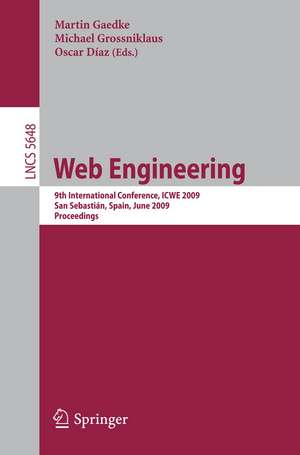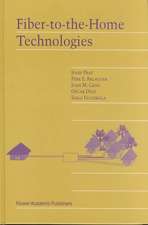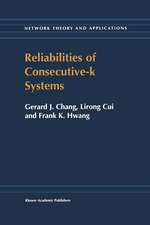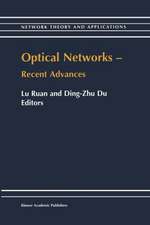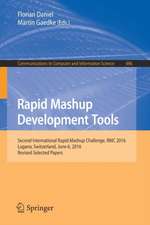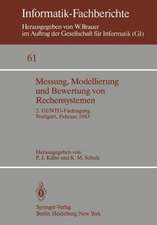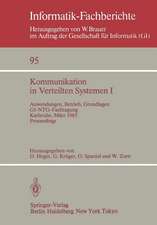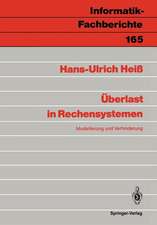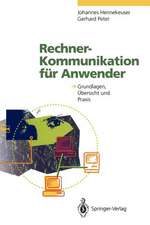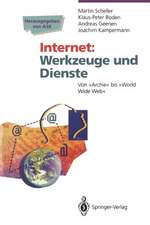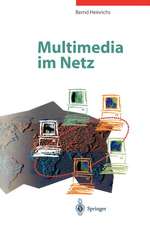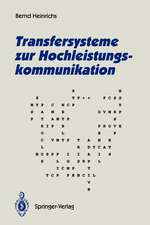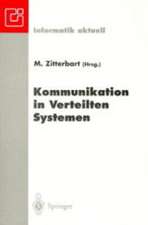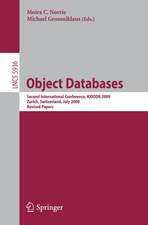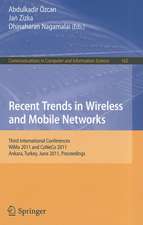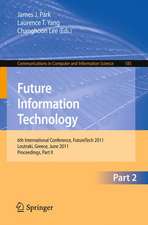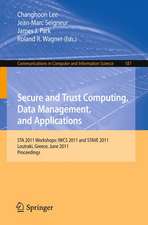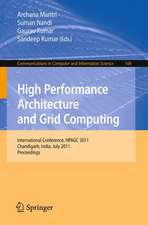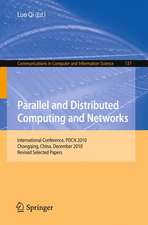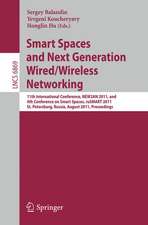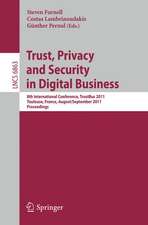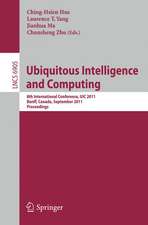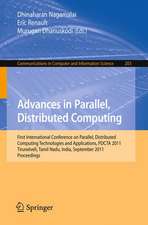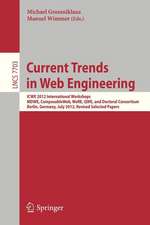Web Engineering: 9th International Conference, ICWE 2009 San Sebastián, Spain, June 24-26 2009 Proceedings: Lecture Notes in Computer Science, cartea 5648
Editat de Martin Gaedke, Michael Grossniklaus, Oscar Díazen Limba Engleză Paperback – 15 iun 2009
Din seria Lecture Notes in Computer Science
- 20%
 Preț: 1061.55 lei
Preț: 1061.55 lei - 20%
 Preț: 307.71 lei
Preț: 307.71 lei - 20%
 Preț: 438.69 lei
Preț: 438.69 lei - 20%
 Preț: 579.30 lei
Preț: 579.30 lei -
 Preț: 410.88 lei
Preț: 410.88 lei - 17%
 Preț: 427.22 lei
Preț: 427.22 lei - 20%
 Preț: 596.46 lei
Preț: 596.46 lei - 15%
 Preț: 448.04 lei
Preț: 448.04 lei - 20%
 Preț: 353.50 lei
Preț: 353.50 lei -
 Preț: 389.49 lei
Preț: 389.49 lei - 20%
 Preț: 309.90 lei
Preț: 309.90 lei - 20%
 Preț: 645.28 lei
Preț: 645.28 lei - 20%
 Preț: 763.23 lei
Preț: 763.23 lei - 15%
 Preț: 580.46 lei
Preț: 580.46 lei - 20%
 Preț: 310.28 lei
Preț: 310.28 lei - 20%
 Preț: 655.02 lei
Preț: 655.02 lei - 20%
 Preț: 1183.14 lei
Preț: 1183.14 lei - 20%
 Preț: 340.32 lei
Preț: 340.32 lei -
 Preț: 449.57 lei
Preț: 449.57 lei - 20%
 Preț: 591.51 lei
Preț: 591.51 lei - 18%
 Preț: 938.83 lei
Preț: 938.83 lei - 20%
 Preț: 337.00 lei
Preț: 337.00 lei - 20%
 Preț: 649.50 lei
Preț: 649.50 lei - 20%
 Preț: 607.40 lei
Preț: 607.40 lei - 20%
 Preț: 1414.79 lei
Preț: 1414.79 lei - 20%
 Preț: 1024.44 lei
Preț: 1024.44 lei - 20%
 Preț: 583.40 lei
Preț: 583.40 lei - 20%
 Preț: 453.32 lei
Preț: 453.32 lei - 20%
 Preț: 575.49 lei
Preț: 575.49 lei - 20%
 Preț: 1075.26 lei
Preț: 1075.26 lei - 20%
 Preț: 585.88 lei
Preț: 585.88 lei - 20%
 Preț: 825.93 lei
Preț: 825.93 lei - 17%
 Preț: 360.20 lei
Preț: 360.20 lei - 20%
 Preț: 763.23 lei
Preț: 763.23 lei - 20%
 Preț: 340.32 lei
Preț: 340.32 lei - 20%
 Preț: 504.58 lei
Preț: 504.58 lei - 20%
 Preț: 369.13 lei
Preț: 369.13 lei - 20%
 Preț: 580.93 lei
Preț: 580.93 lei - 20%
 Preț: 343.62 lei
Preț: 343.62 lei - 20%
 Preț: 350.21 lei
Preț: 350.21 lei - 20%
 Preț: 583.40 lei
Preț: 583.40 lei - 20%
 Preț: 583.40 lei
Preț: 583.40 lei - 15%
 Preț: 438.59 lei
Preț: 438.59 lei - 20%
 Preț: 341.95 lei
Preț: 341.95 lei - 20%
 Preț: 238.01 lei
Preț: 238.01 lei - 20%
 Preț: 538.30 lei
Preț: 538.30 lei
Preț: 347.74 lei
Preț vechi: 434.67 lei
-20% Nou
Puncte Express: 522
Preț estimativ în valută:
66.55€ • 69.22$ • 54.94£
66.55€ • 69.22$ • 54.94£
Carte tipărită la comandă
Livrare economică 15-29 aprilie
Preluare comenzi: 021 569.72.76
Specificații
ISBN-13: 9783642028175
ISBN-10: 3642028179
Pagini: 536
Ilustrații: XVII, 536 p.
Dimensiuni: 155 x 235 x 30 mm
Greutate: 0.84 kg
Ediția:2009
Editura: Springer Berlin, Heidelberg
Colecția Springer
Seriile Lecture Notes in Computer Science, Information Systems and Applications, incl. Internet/Web, and HCI
Locul publicării:Berlin, Heidelberg, Germany
ISBN-10: 3642028179
Pagini: 536
Ilustrații: XVII, 536 p.
Dimensiuni: 155 x 235 x 30 mm
Greutate: 0.84 kg
Ediția:2009
Editura: Springer Berlin, Heidelberg
Colecția Springer
Seriile Lecture Notes in Computer Science, Information Systems and Applications, incl. Internet/Web, and HCI
Locul publicării:Berlin, Heidelberg, Germany
Public țintă
ResearchCuprins
Accessibility and Usability.- Fine-Grained Analysis of Web Tasks through Data Visualization.- Exploring Automatic CSS Accessibility Evaluation.- Component-Based Web Engineering: Portals and Mashups.- A Component-Based Approach for Engineering Enterprise Mashups.- Turning Web Applications into Mashup Components: Issues, Models, and Solutions.- Tagging-Aware Portlets.- Data and Semantics.- Trust and Reputation Mining in Professional Virtual Communities.- A Structured Approach to Data Reverse Engineering of Web Applications.- Harnessing the Power of Semantics-Based, Aspect-Oriented Adaptation for amacont.- Model-Driven Web Engineering.- Model-Driven Web Engineering for the Automated Configuration of Web Content Management Systems.- Bridging Test and Model-Driven Approaches in Web Engineering.- A Requirement Analysis Approach for Using i* in Web Engineering.- Navigation.- Automating Navigation Sequences in AJAX Websites.- Modelling and Verification of Web Navigation.- Context-Driven Hypertext Specification.- Process, Planning and Phases.- Feature-Based Engineering of Compensations in Web Service Environment.- Product Line Development of Web Systems with Conventional Tools.- An Empirical Study on the Use of Web-COBRA and Web Objects to Estimate Web Application Development Effort.- Quality.- An Extensible Monitoring Framework for Measuring and Evaluating Tool Performance in a Service-Oriented Architecture.- A Quality Model for Mashup Components.- Towards the Discovery of Data Quality Attributes for Web Portals.- Rich Internet Applications.- Script InSight: Using Models to Explore JavaScript Code from the Browser View.- A Conceptual Framework for User Input Evaluation in Rich Internet Applications.- Patterns for the Model-Based Development of RIAs.- Adapting the Presentation Layer in Rich Internet Applications.- Search.- Web Site Metadata.- Conceptual Modeling of Multimedia Search Applications Using Rich Process Models.- Zero-Effort Search and Integration Model for Augmented Web Applications.- Testing.- A Higher Order Generative Framework for Weaving Traceability Links into a Code Generator for Web Application Testing.- Exploring XML Perturbation Techniques for Web Services Testing.- Facilitating Controlled Tests of Website Design Changes: A Systematic Approach.- Web Services, SOA and REST.- SOAF – Design and Implementation of a Service-Enriched Social Network.- RESTful Transactions Supported by the Isolation Theorems.- An Optimization Rule for ActiveXML Workflows.- Web 2.0.- Personal News RSS Feeds Generation Using Existing News Feeds.- A Tag Clustering Method to Deal with Syntactic Variations on Collaborative Social Networks.- Relating RSS News/Items.- A Layout-Independent Web News Article Contents Extraction Method Based on Relevance Analysis.- Posters.- HyperAdapt: Enabling Aspects for XML.- Developing an Enterprise Web Application in XQuery.- Enhancing WS-BPEL Dynamic Invariant Generation Using XML Schema and XPath Information.- CRUISe: Composition of Rich User Interface Services.- An Online Platform for Semantic Validation of UML Models.- Efficient Building of Interactive Applications Guided by Requirements Models.- WAB*: A Quantitative Metric Based on WAB.- A Web-Based Mashup Tool for Information Integration and Delivery to Mobile Devices.- Demonstrations.- UWE4JSF: A Model-Driven Generation Approach for Web Applications.- On Using Distributed Extended XQuery for Web Data Sources as Services.- Automatic Generation of RIAs Using RUX-Tool and Webratio.- MagicUWE – A CASE Tool Plugin for Modeling Web Applications.- A Model-BasedApproach Providing Context-Sensitive Television Interaction.- Model-Driven Development of Audio-Visual Web Search Applications: The PHAROS Demonstration.- beContent: A Model-Driven Platform for Designing and Maintaining Web Applications.- InSCo-Gen: A MDD Tool for Web Rule-Based Applications.- A Tool to Support End-User Development of Web Applications Based on a Use Case Model.- MODiCo: A Multi-Ontology Web Service Discovery and Composition System.
Textul de pe ultima copertă
This book constitutes the refereed proceedings of the 9th International Conference on Web Engineering, ICWE 2009, held in San Sebastian, Spain in June 2009.
The 22 revised full papers and 15 revised short papers presented together with 8 posters and 10 demonstration papers were carefully reviewed and selected from 90 submissions. The papers are organized in topical sections on accessibility and usability, component-based web engineering: portals and mashups, data and semantics, model-driven web engineering, navigation, process, planning and phases, quality, rich internet applications, search, testing, web services, SOA and REST, and web 2.0.
The 22 revised full papers and 15 revised short papers presented together with 8 posters and 10 demonstration papers were carefully reviewed and selected from 90 submissions. The papers are organized in topical sections on accessibility and usability, component-based web engineering: portals and mashups, data and semantics, model-driven web engineering, navigation, process, planning and phases, quality, rich internet applications, search, testing, web services, SOA and REST, and web 2.0.
